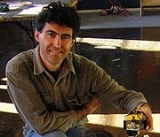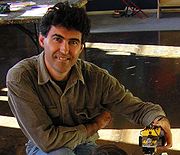
Russell K. Standish
Encyclopedia
Russell K. Standish is a computational scientist
based in Sydney
, Australia
. He was the founding director of UNSW's High Performance Computing Support Unit from 1997-2005. In 2005 he established a computational science consultancy called High Performance Coders. Since 2002, he has held an adjunct associate professorship with UNSW's School of Mathematics and Statistics. He grew up in Western Australia with 2 younger brothers, Mark (middle child) and Tony (youngest). He is married to Kim Crichton with 1 child, named Hal.

in 1997. He has also been an extensive contributor to the Everything List, an informal discussion group on these ideas, and has published several papers in the area.
research. He often uses Artificial Life
models to explore evolutionary behaviour.
Computational scientist
A computational scientist is a person skilled in scientific computing. This person is usually a scientist, an engineer, or an applied mathematician who applies high-performance computers in different ways to advance the state-of-the-art in their respective applied disciplines in physics, chemistry...
based in Sydney
Sydney
Sydney is the most populous city in Australia and the state capital of New South Wales. Sydney is located on Australia's south-east coast of the Tasman Sea. As of June 2010, the greater metropolitan area had an approximate population of 4.6 million people...
, Australia
Australia
Australia , officially the Commonwealth of Australia, is a country in the Southern Hemisphere comprising the mainland of the Australian continent, the island of Tasmania, and numerous smaller islands in the Indian and Pacific Oceans. It is the world's sixth-largest country by total area...
. He was the founding director of UNSW's High Performance Computing Support Unit from 1997-2005. In 2005 he established a computational science consultancy called High Performance Coders. Since 2002, he has held an adjunct associate professorship with UNSW's School of Mathematics and Statistics. He grew up in Western Australia with 2 younger brothers, Mark (middle child) and Tony (youngest). He is married to Kim Crichton with 1 child, named Hal.

Ensemble theories of everything
In 2006, Standish published a book Theory of Nothing that takes a look at ensemble theories of everything, a subject reinvigorated by Max TegmarkMax Tegmark
Max Tegmark is a Swedish-American cosmologist. Tegmark is a professor at the Massachusetts Institute of Technology and belongs to the scientific directorate of the Foundational Questions Institute.-Early life:...
in 1997. He has also been an extensive contributor to the Everything List, an informal discussion group on these ideas, and has published several papers in the area.
Complex Systems, Evolutionary Systems, Artificial Life
Standish has been a long time contributor to the study of evolutionary systems, an important subcategory of Complex SystemsComplex system
A complex system is a system composed of interconnected parts that as a whole exhibit one or more properties not obvious from the properties of the individual parts....
research. He often uses Artificial Life
Artificial life
Artificial life is a field of study and an associated art form which examine systems related to life, its processes, and its evolution through simulations using computer models, robotics, and biochemistry. The discipline was named by Christopher Langton, an American computer scientist, in 1986...
models to explore evolutionary behaviour.
- In 1998, he chaired Complex Systems '98, one of a series of conferences now known as the Asia Pacific Complex Systems conference.
- In 2002, he chaired ALife VIII, The 8th International Conference on the Simulation and Synthesis of Living Systems.
- He is the lead developer of EcoLab, an open sourceOpen sourceThe term open source describes practices in production and development that promote access to the end product's source materials. Some consider open source a philosophy, others consider it a pragmatic methodology...
C++C++C++ is a statically typed, free-form, multi-paradigm, compiled, general-purpose programming language. It is regarded as an intermediate-level language, as it comprises a combination of both high-level and low-level language features. It was developed by Bjarne Stroustrup starting in 1979 at Bell...
based agent based modelling framework.
Statistical Mechanics of Nonequilibrium Systems
Standish's PhD involved research into nonequilibrium statistical mechanicsStatistical mechanics
Statistical mechanics or statistical thermodynamicsThe terms statistical mechanics and statistical thermodynamics are used interchangeably...

